
Earthling is the 21st studio album by the English musician David Bowie, released on 3 February 1997 through RCA Records in the United Kingdom, Virgin Records in the United States, and Arista Records/BMG in other territories. Mostly self-produced by Bowie, it was primarily recorded from August to October 1996 at New York City's Looking Glass Studios. Bowie composed the tracks with Reeves Gabrels and Mark Plati, who are credited as co-producers, with Mike Garson, Gail Ann Dorsey and Zack Alford providing overdubs later.
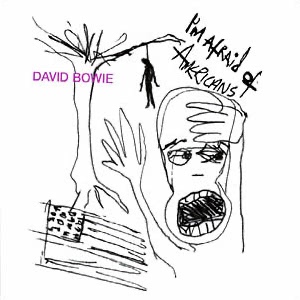
"I'm Afraid of Americans" is a song by the English musician David Bowie, released as a single from his album Earthling on 14 October 1997 through Virgin Records. The song was co-written by Bowie and Brian Eno and originally recorded during the sessions for Bowie's 1995 album Outside; this version was released on the soundtrack of Showgirls (1995). The song was then remade during the sessions for Earthling, featuring rewritten lyrics, overdubs and transposed verses. An industrial and techno track, it presents a critique of America through the eyes of a stereotypical "Johnny" and is characterised by drum patterns, synthesisers, various loops and vocal distortions.

Reeves Gabrels is an American guitarist, songwriter and producer. Currently a member of The Cure since 2012, Gabrels is also known for his work with David Bowie and Tin Machine from 1987 to 1999. He also fronts the band Reeves Gabrels & His Imaginary Friends, which is based in Nashville.

Hours is the 22nd studio album by the English musician David Bowie. It was originally released on 21 September 1999 through the Internet on the artist's website BowieNet, followed by a physical CD release on 4 October through Virgin Records. It was one of the first albums by a major artist available to download over the Internet. Originating as a soundtrack to the video game Omikron: The Nomad Soul (1999), Hours was the final collaboration between Bowie and guitarist Reeves Gabrels, with whom he had worked since 1988. The album was recorded in mid-1999 between studios in Bermuda and New York City. A song contest conducted on BowieNet in late 1998 resulted in a fan contributing lyrics and backing vocals to one of the tracks.

Tin Machine Live: Oy Vey, Baby is a live album by Anglo-American rock band Tin Machine, originally released through London Records on 2 July 1992. The album includes songs, all from the band's two albums, recorded between 20 November 1991 and 11 February 1992 from five different venues on the North American and Asian legs of Tin Machine's It's My Life Tour. The maligned album title was intended as a pun on U2's 1991 album Achtung Baby. Oy Vey, Baby has received negative reviews, with many criticising the performances. It failed to chart in both the UK and the US. It was accompanied by a concert video of the same title, which was filmed at The Docks, Hamburg on 24 October 1991. Following its release, Tin Machine disbanded and Bowie quickly resumed his solo career with Black Tie White Noise (1993).

"Tin Machine" is a song by Anglo-American hard rock band Tin Machine, and the song from which they took their name, a track from their debut album, also of the same name. It was released as a single in September 1989, as a double A-side with a live cover of Bob Dylan’s “Maggie's Farm”.
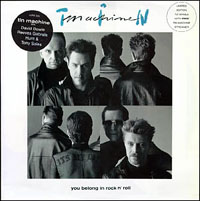
"You Belong in Rock n' Roll" is a song by Anglo-American hard rock band Tin Machine, released ahead of their second album in August 1991. The song was the band’s first release on Victory Records, which was distributed by London Records in the UK.

"Baby Universal" is a song by Anglo-American hard rock band Tin Machine, released as the second single from their Tin Machine II album in October 1991.

"Little Wonder" is a song by English musician David Bowie, released as the second single from his 21st album, Earthling (1997). "Little Wonder" backed by three remixes, was issued on 27 January 1997. The single was a success, peaking at number 14 in the UK and topping the chart in Japan. The accompanying music video was directed by Floria Sigismondi and depicts Bowie at three different ages. Biographer David Buckley considers it a dance-oriented video rather than a rock one, reminiscent of Orbital's "The Box" (1996).
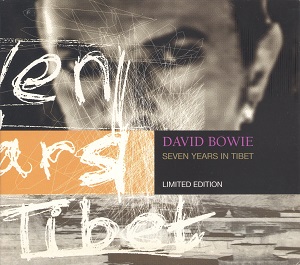
"Seven Years in Tibet" is a song written by English musician David Bowie and Reeves Gabrels from the 1997 album, Earthling. It was released as the album's fourth single. In some territories, a version of the song sung by Bowie in Mandarin Chinese was released as "A Fleeting Moment".

"Dead Man Walking" is a song by English musician David Bowie, released as the third single from his 21st studio album, Earthling (1997). Written by Bowie and Reeves Gabrels, it was a top 40 hit in the UK, peaking at number 32. Bowie described "Dead Man Walking" as his homage "to rock and roll that is still young while we are all growing old". As such, the lyrics reflect his thoughts on aging at this point in his career.
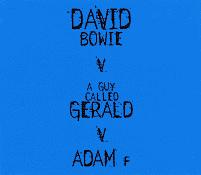
"Telling Lies" is a song by English singer-songwriter David Bowie, written and released for downloading and as a single in 1996 and later included on his 21st studio album, Earthling (1997). The song was initially an Internet-only release, and was the first-ever downloadable single by a major artist. No music video was produced for the song.

"Thursday's Child" is a song recorded by David Bowie for his twenty-second studio album Hours (1999). Written by Bowie and Reeves Gabrels, the song was released as the album's lead single on 20 September 1999, by Virgin Records.

"Survive" is a song by the English musician David Bowie from his 1999 album Hours. It was later released in remixed form as the album's third single on 17 January 2000, reaching number 28 in the UK. Written by Bowie and Reeves Gabrels, it is a reflective number detailing the end of a relationship. Musically, it recalls the sound of Bowie's folk rock music of the late 1960s, and 1971's Hunky Dory. Its music video echoes the reflective quality of the recording, portraying Bowie levitating at a kitchen table with an egg. Praised as a highlight of Hours, Bowie performed "Survive" frequently through 1999 and 2000.
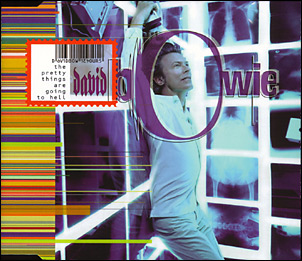
"The Pretty Things Are Going to Hell" is a song by the English musician David Bowie from his 1999 album Hours. Written by Bowie and Reeves Gabrels, its title references past songs such as "Oh! You Pretty Things" and the Stooges' Raw Power track "Your Pretty Face Is Going to Hell". On Hours, the song is a rockier number that contains elements of 1970s glam rock. The lyrics offer views on disillusionment and aging. The song was first released in a different mix in the film Stigmata before being released as the first single from the album in Australia and Japan, replacing "Thursday's Child". An unreleased music video was filmed that depicted Bowie encountering several of his past personas. It was performed live in 1999 and 2000.
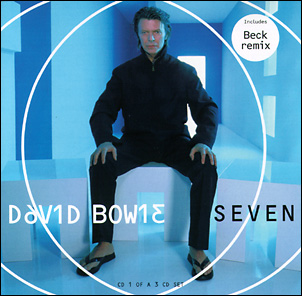
"Seven" is a song written by David Bowie and Reeves Gabrels for the album Hours in 1999. As with some of the other songs from Hours it was originally written for the computer game Omikron - The Nomad Soul from 1999. In July 2000, it was released as the fourth single from the album. The version used in the Omikron – The Nomad Soul was called "Demo version" on the single releases.
"I've Been Waiting for You" is a song written by Neil Young, which he recorded for his 1968 debut solo album. In a song review for AllMusic, critic Matthew Greenwald described it as "One of the most powerful and well-crafted songs from Neil Young's self-titled solo debut ... A very strong and engaging melody is set against a striking, descending guitar riff, which serves as the song's hook."

A Reality Tour was a worldwide concert tour by the English singer-songwriter David Bowie in support of his 2003 album Reality. The tour began on 7 October 2003 at the Forum Copenhagen, Denmark, continuing through Europe, North America, Asia, including a return to New Zealand and Australia for the first time since the 1987 Glass Spider Tour. At over 110 shows, the tour was the longest tour of Bowie's career. A heart attack in late June 2004 forced the cancellation of some dates near the end of the tour. Bowie retired from performing live in 2006, making this tour his last.

LiveAndWell.com is a 1999 limited edition live album by David Bowie. It was not available commercially and could only be acquired by being subscribed to BowieNet at the time. The album is made up of recordings from the 1997 Earthling Tour, featuring songs from the albums Outside (1995) and Earthling (1997)
The Hours Tour was a small-scale promotional concert tour by the English singer-songwriter David Bowie comprising a handful of live performances and numerous television appearances in support of the album Hours in late 1999. Several live songs from the tour were included as b-sides to singles from the album, and concert recordings from the tour were released in 2020 as Something in the Air and in 2021 with David Bowie At The Kit Kat Klub .
















